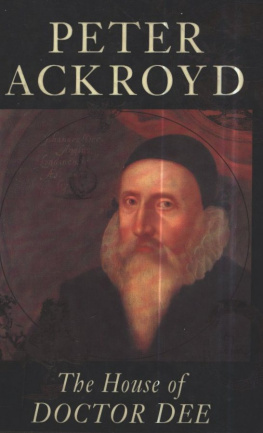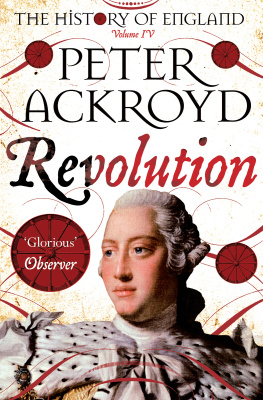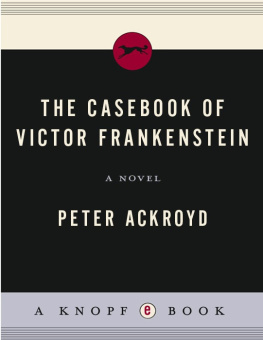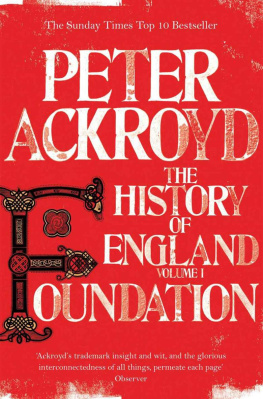Peter Ackroyd - Poe
Here you can read online Peter Ackroyd - Poe full text of the book (entire story) in english for free. Download pdf and epub, get meaning, cover and reviews about this ebook. year: 2008, publisher: ePubLibre, genre: Non-fiction. Description of the work, (preface) as well as reviews are available. Best literature library LitArk.com created for fans of good reading and offers a wide selection of genres:
Romance novel
Science fiction
Adventure
Detective
Science
History
Home and family
Prose
Art
Politics
Computer
Non-fiction
Religion
Business
Children
Humor
Choose a favorite category and find really read worthwhile books. Enjoy immersion in the world of imagination, feel the emotions of the characters or learn something new for yourself, make an fascinating discovery.
- Book:Poe
- Author:
- Publisher:ePubLibre
- Genre:
- Year:2008
- Rating:5 / 5
- Favourites:Add to favourites
- Your mark:
- 100
- 1
- 2
- 3
- 4
- 5
Poe: summary, description and annotation
We offer to read an annotation, description, summary or preface (depends on what the author of the book "Poe" wrote himself). If you haven't found the necessary information about the book — write in the comments, we will try to find it.
Poe — read online for free the complete book (whole text) full work
Below is the text of the book, divided by pages. System saving the place of the last page read, allows you to conveniently read the book "Poe" online for free, without having to search again every time where you left off. Put a bookmark, and you can go to the page where you finished reading at any time.
Font size:
Interval:
Bookmark:

Noted author Ackroyd (The Thames) adds to his one-man Brief Lives series this exploration of the shortand predominantly miserablelife of Edgar Allan Poe. Bringing his novelists skills to bear, Ackroyd opens with Poes mysterious death in 1849: Like his narratives and his fables, Poes own story ends abruptly and inconclusively. Born in Boston in 1809 to traveling actors and orphaned in 1811, Poe was adopted by Richmond, Va., merchant John Allan. Their relationship soured, and Poe left for a rocky academic career at the University of Virginia and a stint at West Point, and in 1836 he married his 13-year-old cousin, Virginia. Despite critical acclaim for his workfrom 1839s The Fall of the House of Usher to his famous 1845 poem, The RavenPoe constantly struggled with alcoholism and poverty, alienating almost everyone he met. At age 40, Poe was discovered dying in a Baltimore tavern his whereabouts for the previous week remain unknown. But Ackroyd never demonizes the melancholic man who influenced writers as diverse as Jules Verne and James Joyce, and his readable account should appeal to Poe devotees and newcomers alike.

Peter Ackroyd
A life cut short
ePub r1.0
Red_S12.10.13
Ttulo original: Poe
Peter Ackroyd, 2008
Editor digital: Red_S
ePub base r1.0
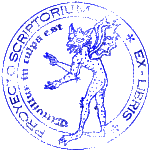

NOMBRE DEL AUTOR. Lorem ipsum dolor sit amet, consectetur adipiscing elit. Nunc vel libero sed est ultrices elementum at vel lacus. Sed laoreet, velit nec congue pellentesque, quam urna pretium nunc, et ultrices nulla lacus non libero. Integer eu leo justo, vel sodales arcu. Donec posuere nunc in lectus laoreet a rhoncus enim fermentum. Nunc luctus accumsan ligula eu molestie. Phasellus vitae elit in eros ornare tempor quis sed sapien. Aliquam eu nisl placerat mi scelerisque semper. Pellentesque habitant morbi tristique senectus et netus et malesuada fames ac turpis egestas. Nulla aliquam, turpis in volutpat tincidunt, nisl ipsum ultrices augue, eu pretium sapien lorem non nibh. Vestibulum accumsan placerat scelerisque.
 O n the evening of 26 September 1849, Edgar Allan Poe stopped in the office of a physician in Richmond, VirginiaJohn Carterand obtained a palliative for the fever that had beset him. Then he went across the road and had supper in a local inn. He took with him, by mistake, Dr. Carter's malacca sword cane.
O n the evening of 26 September 1849, Edgar Allan Poe stopped in the office of a physician in Richmond, VirginiaJohn Carterand obtained a palliative for the fever that had beset him. Then he went across the road and had supper in a local inn. He took with him, by mistake, Dr. Carter's malacca sword cane.
Poe was about to embark on the steamboat to Baltimore. This was the first stop on his way to New York, where he had business to transact. The boat was to leave at four o'clock on the following morning, for a journey that would last approximately twenty-five hours. He seemed to the friends who saw him off to be cheerful and sober. He expected to be away from Richmond for no more than two weeks. Yet he forgot to take his luggage with him. This was the last verifiable sighting of Poe until he was found dying in a tavern six days later.
He arrived in Baltimore on Friday, 28 September. He lingered in this city, instead of making his way to Philadelphia, the next stop on his way to New York, and there are accounts of his drinking. He may have been drinking to ward off the effects of the fever. He may have feared a precipitate heart attack. He had been told, by the doctors in Richmond, that his next seizure would prove fatal.
It is possible that he then travelled by train to Philadelphia. He visited some friends in that city, and became drunk or ill. On the following morning, in his bewildered state, he declared that he was going on to New York. But in fact, by accident or design, he returned to Baltimore. There are unsubstantiated reports that he then tried to return once more to Philadelphia but was found insensible on the train. The conductor took him back to Baltimore. The truth is lost. Everything is in a mist.
Neilson Poe, his cousin, later wrote to Poe's mother-in-law and unofficial guardian, Maria Clemm, that at what time he arrived in the city [Baltimore], where he spent the time he was here, or under what circumstances, I have been unable to ascertain. Despite much research and speculation, no further light has been thrown upon the matter. He may have been wandering through the streets, or making his unsteady way from tavern to tavern. All that is known for certain is that, on 3 October, a newspaper printer sent a message to Joseph Evans Snodgrass: There is a gentleman, rather the worse for wear, at Ryan's 4th ward polls, who goes under the cognomen of Edgar A. Poe, and who appears to be in great distress, & he says he is acquainted with you, and I assure you, he is in need of immediate assistance. Snodgrass had been the editor of the Saturday Visiter, to which Poe had contributed. Ryan's 4th ward polls refers to a tavern that was being used as a polling place for Congressional elections taking place that day; Ryan was the name of the proprietor of the tavern.
The printer's note was sufficiently serious to summon Snodgrass. He entered the barroom and found Poe sitting, stupefied, with a crowd of drinking men around him. His odd clothes caught Snodgrass's attention. He was wearing a tattered straw hat, and a pair of badly fitting trousers. He had a secondhand coat, but no sign of waistcoat or neckcloth. With the possible exception of the straw hat, these were not the clothes with which he had left Richmond. Yet, surprisingly, he still held Dr. Carter's malacca cane. In his inebriated and beleaguered state, it might have seemed to him an instrument of defence.
Snodgrass did not approach him, but ordered a room for him in the same tavern. He was about to send word to Poe's relatives in Baltimore, when two of them coinciden-tally arrived. One was Poe's cousin Henry Herring, who had come to the tavern on electoral business. He was related to a local politician. Snodgrass recalled that they declined to take private care of him on the grounds that he had in the past been abusive in this state of intoxication; instead they advised that Poe be removed to a local hospital. They managed to get him into a carriage, carrying him as if a corpse, and he was admitted to Washington College Hospital.
The resident physician, John Moran, later reported that Poe remained unconscious of his condition until early the following morning. His stupor was then succeeded by tremor of the limbs as well as delirium with constant talkingand vacant converse with spectral and imaginary objects on the walls. Only on the second day after his admission, Friday, 5 October, did he recover his tranquillity. He began to talk, but he was not coherent. He told the doctor that he had a wife in Richmond, which was not true, and that he did not know when he had left that city. The doctor then reassured him that he would soon be in the company of friends, at which point he broke out in an agony of self-reproach at his degradation, protesting that the best thing a friend might do for him was to blow out his (Poe's) brains. Then he fell into a slumber.
On waking he passed into delirium. On the Saturday evening he began to call out Reynolds, and did so continually until three on the following Sunday morning. Having become enfeebled from exertion, the doctor wrote, he became quiet and seemed to rest for a short time, then gently moving his head he said
Font size:
Interval:
Bookmark:
Similar books «Poe»
Look at similar books to Poe. We have selected literature similar in name and meaning in the hope of providing readers with more options to find new, interesting, not yet read works.
Discussion, reviews of the book Poe and just readers' own opinions. Leave your comments, write what you think about the work, its meaning or the main characters. Specify what exactly you liked and what you didn't like, and why you think so.



